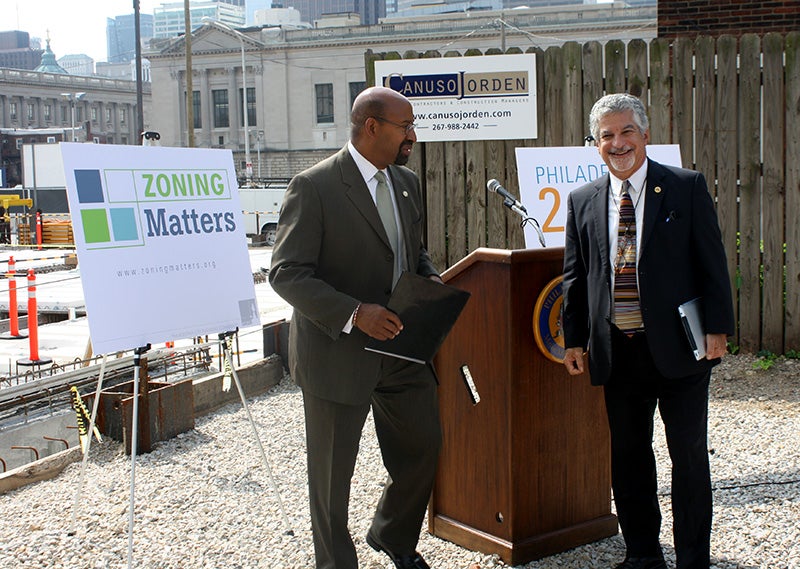Council amendments to clean-up bill would roll back more of new zoning code

Councilman Brian O’Neill wants to prohibit passive and active recreation in the CMX-2 zoning district. And fraternal organizations. And pet stores, and building supply stores, and transit stations—all uses permitted by right in the zoning code that took effect this summer. He also wants to make other by-right uses—such as artist and recording studios, gas stations, and community gardens—into Special Exceptions. And to prohibit educational and religious facilities in light-industrial districts.
Meanwhile, Councilwoman Jannie Blackwell wants to soften some portions of the code’s provision on Registered Community Organizations, easing the requirements for becoming an RCO, and requiring that zoning applicants merely “make a good faith effort” to notify RCOs when projects are going up in their neighborhoods.
Her amendment would also require developers to notify not only the RCO, but also everyone within one block of the project address, as well as the district councilmember.
Last Wednesday, City Council’s Committee on Rules adjourned a hearing on Bill No. 120774—which is intended to revise, clarify, and make “technical changes” to the new zoning code—without voting on a recommendation for the bill. The Committee had decided back in June that Council needed more time to consider the changes and, deciding so again last week, continued the hearing until Wednesday, Nov. 14th.
Councilman O’Neill’s amendments to the industrial-district use tables were provided to the Committee at the beginning of the hearing. But his proposed changes to the commercial use tables didn’t come until around 2 in the afternoon, minutes before the hearing was adjourned.
Eva Gladstein, deputy director of the Planning Commission, asked that the changes not be added to the clean-up bill.
Bob Yerkov, an aide to Councilman O’Neill, made the somewhat Orwellian argument that the proposed changes are not really changes at all, in that they simply revert to some of the same use classifications of the old zoning code. The Committee then decided to put off a recommendation, to give the Planning Commission, which is responsible for the contents of the clean-up bill, time to “negotiate” with Council.
O’Neill and Yerkov did not respond to requests for comment on Friday.
The clean-up bill, as it has come to be called, was drafted by the Planning Commission in the spring as a means of putting finishing touches on the zoning code, correcting grammatical errors, and making sure its definitions are consistent. But it also makes changes which are not merely “technical,” as Eva Gladstein pointed out in her testimony at the Rules Committee hearing.
Among the non-technical changes in the bill:
- Removal of the provision which allowed for individuals to ask for code interpretations from the Department of Licenses and Inspections
- Requirement of notice to district councilmembers for projects that require ZBA approval or Civic Design Review
- Clarifying that a “minor amendment” to a master plan includes an addition of no more than 5,000 square feet
- Addition of an overlay for North Central Philadelphia
- Requirement that the Zoning Board provide its decisions on Special Exception cases in writing
The proposed amendments, in the form they were drafted as of Wednesday, are attached to this article. The zoning code contains a requirement that a handful of city agencies perform a comprehensive review of the code’s first year in effect next August. Some, including some members of the Planning Commission staff, see the series of proposed changes to the code floated in the last week as premature.
Referring specifically to the use-table amendments from O’Neill and the RCO amendments from Blackwell, Eva Gladstein said, “These are very significant changes, and we would prefer to have more time to evaluate how the new zoning code is working.”
Contact the reporter at jaredbrey@gmail.com and follow him on Twitter @jaredbrey
WHYY is your source for fact-based, in-depth journalism and information. As a nonprofit organization, we rely on financial support from readers like you. Please give today.



